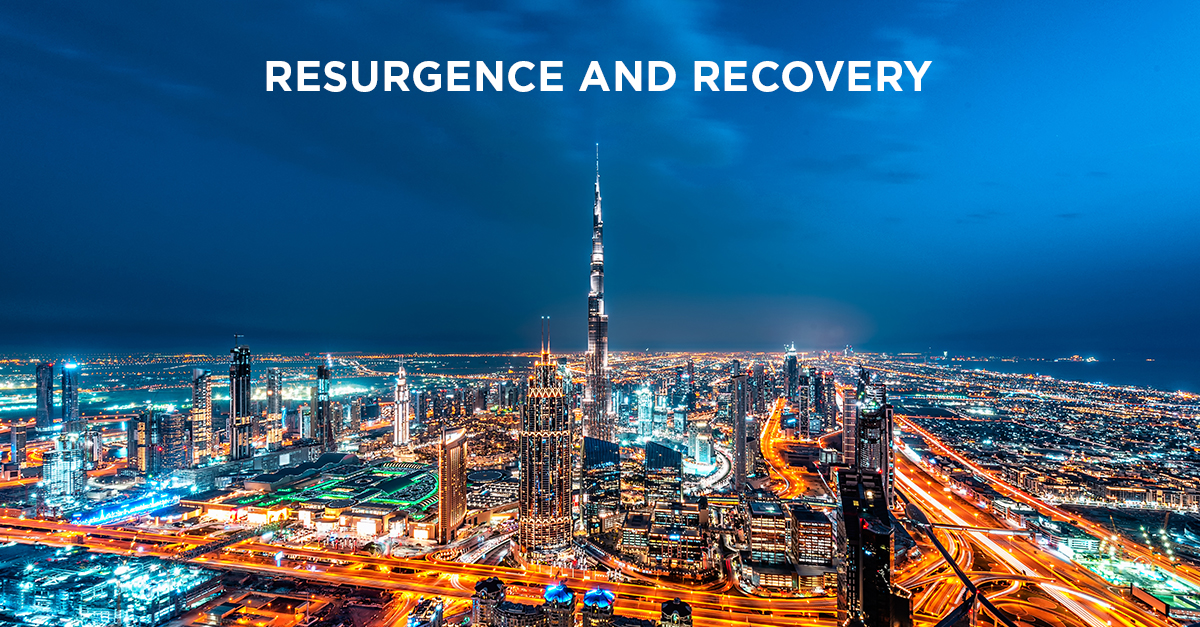Resurgence and Recovery: Why Middle East real estate will be at the heart of the region’s post pandemic revival
Excess economic dependency on the oil and gas industry is gradually becoming a thing of the past for the Middle East. A prolonged downturn and dampened outlook have incentivized governments to renounce their long-standing reliance on fossil fuels and invest in diversification strategies. In fact, this structural trend has been underway since a decade, with the real estate sector being integral to this transition. However, since the Middle East is not a single uniform market, each nation finds itself at a different stage in this quest, with specific economies having to contend with variations in geopolitical tensions, trade wars, climate regulations and complex oil economics.
The COVID-19 pandemic has, of course, resulted in a significant disruption to this progress, impacting several critical functions across the business landscape. Fortunately, real estate, being a slow moving asset class where change begins to manifest gradually, allows for opportunities to implement timely measures. According to Savills(1), this pandemic could accelerate underlying structural trends that were on the back burner for many years. In other words, diversification strategies could soon gain momentum, leading to growth in alternative economic sectors, including real estate. As it turns out, several sovereign wealth funds and private investors are also waiting with ‘dry powder’, seeking investment opportunities in competitive markets. This bodes well for the Middle East, whose markets together boast $5.8 trillion worth of projects(2) in the pipeline, at the moment.
Timely measures
Middle East real estate markets have taken decisive steps in the wake of the virus outbreak. Notably, the Kingdom of Bahrain has deferred mortgage installments for up to six months, along with relief from rental payments for both residential and industrial properties; Qatar has provided rent relief to industrial facilities for six months; the Kingdom of Saudi Arabia has postponed several payments; while the UAE has permitted higher exposure of banks to real estate, increased the LTV ratios for first-time buyers, and introduced a host of real estate-centric stimulus measures.
In the short to medium term, these timely measures are expected to restore investor confidence and expedite the recovery process. That said, the post-pandemic outlook is also difficult to completely predict. It is characterized by ambiguities, lingering questions and lack of credible information. Real estate growth needs to be looked at within a framework of innovation, international affairs and market-specific opportunities.
Events and eventualities
In recent years, several Middle Eastern nations, particularly the UAE and Saudi Arabia, are edging towards becoming knowledge-based economies, which has had a knock-on effect on regional real estate practices. Industry professionals are incorporating modern construction techniques, automation and smart building technologies, to create value and generate investor interest. Having evolved from product-based propositions to experience-based innovation, real estate professionals have opened new doors to exciting opportunities — ones that could translate to a speedier post-pandemic recovery.
Geo-politically, the Middle East is in a relatively unique position, as an investment safe haven impervious to many external perils. Case in point: the vestigial trade war between US and China, and the latter’s new-found ill repute as the alleged origin of the pandemic, are not without economic ramifications. Risk-averse investors are pulling out of China and looking at opportunities in markets that promise stability and security. At the same time, the Middle East markets are witnessing increasing investments from China itself, particularly in real estate. Notwithstanding their long-term political implications, such inflows of foreign investment can help invigorate the sector in the face of an unprecedented crisis, besides rendering a macroeconomic impact.
Real estate resurgence in the UAE
The UAE’s build-it-and-they-will-become stance has been bearing fruit, helping the previously oil-centric economy make a rewarding transition into a knowledge-based economy. Following the outbreak, The UAE launched the highest stimulus package in the Middle East, accompanied by a slew of real estate-focused policies. Combined with existing affordability and favourable demographic trends, these measures could culminate in a market rebound next year, in time with the commencement of the rescheduled Expo. By Savills’ estimate(3), Dubai is the most affordable among prime residential markets, at $730 per sq. ft. Such findings could entice international buyers, who will not only find a low overall cost to buy (5%) and sell (1%), but also 0% holding cost.
On the other hand, the global real estate rental market is expected to grow(4) from $1759.8 billion in 2019 to $1787.8 billion in 2020, at a CAGR of 1.6%. While the low growth rate is attributed to COVID-19 impact, the post-pandemic revival boils down to resumption of activities closely tied to real estate. Since over a half of UAE’s GDP is generated from hydrocarbons, hospitality, transport and tourism, even a slight relief in lockdown restrictions could energize the economy. The resurgence therefore is not too far-fetched and most likely soon-to-be reality.
- https://dubai.savills.ae/insight-and-opinion/news/300152/savills-impacts-forecasts-real-estate-investor-trends-likely-to-outlast-covid-19
- https://www.saudigazette.com.sa/article/594423
- https://www.savills.com/impacts/Savills_Impacts_2019_download.pdf
- https://www.researchandmarkets.com/reports/5019774/real-estate-rental-global-market-report-2020-30?utm_source=dynamic&utm_medium=GNOM&utm_code=nf8l84&utm_campaign=1397887+-+Real+Estate+Rental+Global+Market+Report+2020-30+-+The+Impact+of+COVID-19+Impact+and+Recovery+Plans+for+the+Industry&utm_exec=cari18gnomd#summary




